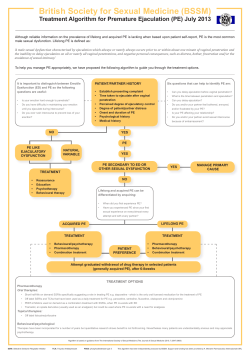
A man’s guide to overcoming Premature Ejaculation
A man’s guide to overcoming Premature Ejaculation Premature ejaculation affects up to 30% of men at some time in their lives yet remains an embarrassing condition which men are uncomfortable talking about. Our guide to premature ejaculation will give you the lowdown on what causes the condition, the impact it can have and advice on a variety of treatments. THE CAUSES of Premature Ejaculation How the condition can occur Premature ejaculation is a common male medical condition yet the precise causes are still not fully understood. Despite its prevalence among men, the subject is largely taboo but failure to talk about or confront the issue often serves to exacerbate the problem for sufferers. Defining what exactly constitutes premature ejaculation can be difficult as different men come at different times – but if it’s a serious concern for both partners then that’s a good working definition of premature ejaculation. This guide talks through the types, causes and impact of premature ejaculation, separates the facts from the fiction, and finally offers advice on the variety of treatments available to help sufferers manage the condition. Let’s start by looking at the two broad types of premature ejaculation: Primary/Lifelong Premature Ejaculation This is where a man has suffered from premature ejaculation since becoming sexually active. It occurs from the first sexual encounter and continues throughout life, and can be attributed to physical or psychological factors or may be hereditary. Primary premature ejaculation is often triggered by psychological impulses, such as conditioning, upbringing, or a traumatic sexual experience. www.doctorfox.co.uk Secondary/Acquired Premature Ejaculation This is when a man goes years without suffering any ejaculation problems but then either gradually or suddenly begins to experience premature ejaculation. The condition may arise gradually or it can happen suddenly. It can be caused by physical triggers such as diabetes, high blood pressure, drinking excessively or using recreational drugs. On the other hand, there may be psychological reasons for the condition, such as depression, stress or an anxiety about sexual performance. Let’s examine the specific causes in a little more detail. www.doctorfox.co.uk Physical causes Ejaculation is controlled by chemicals called ‘neurotransmitters’ which are released by nerve cells in the brain. The neurotransmitter that helps to prevent ejaculation is called serotonin. If your levels of serotonin are disrupted – or if the serotonin signaling in your brain isn’t working normally – you may experience premature ejaculation. Other reasons might be having an overly sensitive penis or if there is abnormal reflex activity in your ejaculation system. There are also certain medical conditions which can trigger premature ejaculation, including erectile dysfunction, an overactive thyroid, certain prostate-related conditions and diabetes. www.doctorfox.co.uk Psychological causes The psychological causes of premature ejaculation vary from person to person. It may occur due to triggers such as relationship problems, anxiety, depression and stress. These may well be linked to lifestyle choices such as heavy drinking or the use of recreational drugs, or troubling personal circumstances such as financial hardship or difficulties in the workplace. Premature ejaculation can also be exacerbated by emotional reactions and personal frustrations about the problem itself. www.doctorfox.co.uk Separating fact from fiction The line between myth and reality often becomes blurred when talking about or dealing with premature ejaculation. Here we separate the fact from the fiction. The key Facts •Approximately 1 in 3 men suffer from premature ejaculation at some time in their lives •Premature ejaculation is not a sickness or disease and even the most sexually active of men can suffer from it •Premature ejaculation is a condition that’s medically recognised by key health organisations such as the World Health Organisation •Substances such as wine, beer and certain pills and drugs can lower inhibitions and heighten sexual pleasure – but abuse of them can lead to erectile dysfunction, the inability to orgasm and premature ejaculation itself •Lack of sleep leads to low serotonin levels in the brain, which triggers your body to ejaculate more rapidly •Masturbating before sex can increase the length of time it takes for a man to ejaculate www.doctorfox.co.uk Premature ejaculation: Separating Facts from Fiction •Women climaxing too soon has been closely linked to premature ejaculation, with many women citing the same anxieties and apprehensions as men for sexually unsatisfying experiences The key Fiction •Premature ejaculation is not a condition that only affects teenagers and sexually inexperienced men – and it doesn’t diminish with age •Artificial stimulants such as alcohol, cocaine and marijuana might temporarily delay ejaculation but the long-term effects can lead to permanent premature ejaculation, as well as combining with psychological with physical problems •There is no tangible evidence to suggest certain foods cause or affect premature ejaculation www.doctorfox.co.uk Are premature ejaculation and erectile dysfunction (ED) linked? No. Premature ejaculation and erectile dysfunction are completely different medical conditions. Premature ejaculation is where a man can get and sustain an erection but is unable to control or delay ejaculation. ED is where a man cannot get or maintain an erection at all, or long enough to have satisfactory sex. Premature ejaculation is more common and affects men of all ages, while ED is more prevalent in older men and generally linked to other health conditions. www.doctorfox.co.uk The Effects of Premature Ejaculation Negative impacts Many men are embarrassed by premature ejaculation and prefer not to talk about it. It can therefore have a seriously detrimental impact on a man’s life and his relationships. It can leave them feeling depressed, anxious, angry and inadequate, with low self-esteem and a problem forming future sexual relationships. Lots of men deceive themselves into thinking it’s a problem that will disappear over time. It won’t. Others don’t think there’s a solution to the problem and, consequently, don’t try certain techniques or talk to anyone about it, including their partner. The effect on the partner Because sex is by-and-large a fundamental aspect of any relationship, premature ejaculation affects the partner too. The man can feel tense and unable to enjoy intercourse, ejaculating too soon, which leaves them both feeling frustrated and disappointed. This can put a serious strain on the relationship, sometimes leading to separation. The culmination of all these factors leaves many men with premature ejaculation feeling anxious, frustrated and depressed and as though they’re trapped in a sexual cul-de-sac. The best way for any couple to deal with premature ejaculation – and ultimately the most effective way of combating it - is to talk openly and honestly about it. By adopting certain methods and techniques, both partners can reap the sexual pleasures of a satisfying and healthy sex life – and the best way to achieve that is by tackling premature ejaculation together. Let’s examine some treatments. www.doctorfox.co.uk TREATING PREMATURE EJACULATION Help is at hand For years, premature ejaculation was only treated with a range of cognitive and behavioural therapies, but now there are pharmacological treatments available, too. The important thing to remember is that different approaches work better for different people and it may take a while to find the most successful treatment – or combination of treatments – for you. Visiting your GP is the best way to get the most appropriate treatment. Selective serotonin reuptake inhibitors (SSRIs) Although originally developed to treat depression, SSRIs are also known to be effective for delaying ejaculation. SSRIs are not specifically licensed to treat PE but it is becoming an increasingly common practice for GPs to prescribe it for this purpose. SSRIs used to treat premature ejaculation include Sertraline, Fluoxetine and Paroxetine. Some men experience an improvement as soon as they start taking the medication, while for others it can take up to two weeks before they notice any significant improvement. Some of the most common side effects of SSRIs include feeling sick or actually being sick, fatigue, excessive sweating and diarrhoea. These symptoms are generally mild and usually don’t last any longer than two or three weeks. www.doctorfox.co.uk Dapoxetine This is an SSRI which has been specifically designed to treat premature ejaculation. Also known as Priligy, Dapoxetine became the UK’s first officially licensed treatment for premature ejaculation in November 2013. Some local authorities can prescribe it on the NHS. Dapoxetine works a lot faster than the SSRIs mentioned above, and can be taken ‘on demand’. If you are prescribed Dapoxetine, you will generally be advised to take it between one and three hours before having sex, although you should not take it more than once a day. Nevertheless, it is not suited to all men who suffer from premature ejaculation, in particular men who suffer from kidney, liver and heart problems. It should not be taken in conjunction with certain other medications such as antidepressants. Dapoxetine’s most common side effects include feeling sick, headaches and dizziness. In most cases these side-effects are only short term. If you would like to begin a confidential online consultation for Priligy, please click here. Topical anaesthetics and condoms Some topical anaesthetics such as prilocaine and lidocaine can be effective, but they can be transferred to the vagina and therefore diminish a woman’s sexual sensation and satisfaction. Condoms are an effective and proven way to help prevent premature ejaculation and work particularly well when combined with local anaesthesia. Self-help techniques The ‘stop-start’ method Here, the man stimulates his penis until he almost ejaculates, allows it to abate, then starts again, repeating several times if necessary. The ‘squeeze’ method A technique whereby the man stimulates his penis until he has the urge to ejaculate, then stops and squeezes the head of the penis until the desire and sensation diminishes. Counselling and therapy Both partners can benefit immensely from sexual therapy, relationship and psychological counseling. This can include techniques for delaying and preventing ejaculation, as well as exercises which reduce stress and enhance relaxation. Visit the College of Sexual and Relationship Therapists website to find suitable counselling in your area. www.doctorfox.co.uk Top tips Talk about It Talking about premature ejaculation openly with a partner and taking the first steps to deal with it are crucial to beat the condition, regain sexual confidence and get back on track for a fulfilling sex life. It’s a medical condition and nobody’s fault, so dealing with it together is the best way forward. There are muscles down there Frequent visitors to the local gym will know that your muscles will be underdeveloped if you don’t consistently exercise. Exactly the same principle applies to the muscles in the penis (Pubococcygeus Muscle, or the PC Muscle). Kegel exercises and ejaculation tips are a good place to start. Be patient As frustrating as premature ejaculation can be, men would be mindful to remember the classic tale of the tortoise and the hare and the moral of the story – no matter how disadvantaged you are, perseverance always pays off in the end. Count plenty of sheep Or, in other words, get lots of sleep. Lack of sleep results in low serotonin levels in the brain, and the lower levels prompt your body to ejaculate more quickly. Consultation If you would like a confidential online consultation regarding premature ejaculation, please click here. www.doctorfox.co.uk
© Copyright 2025










